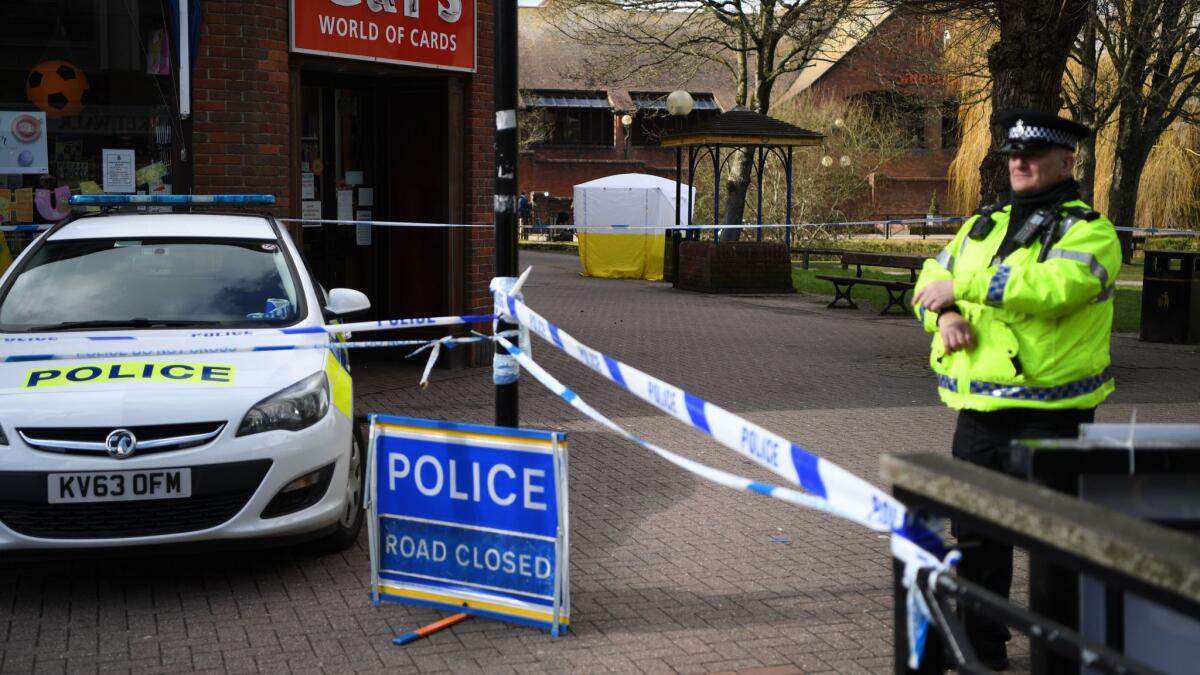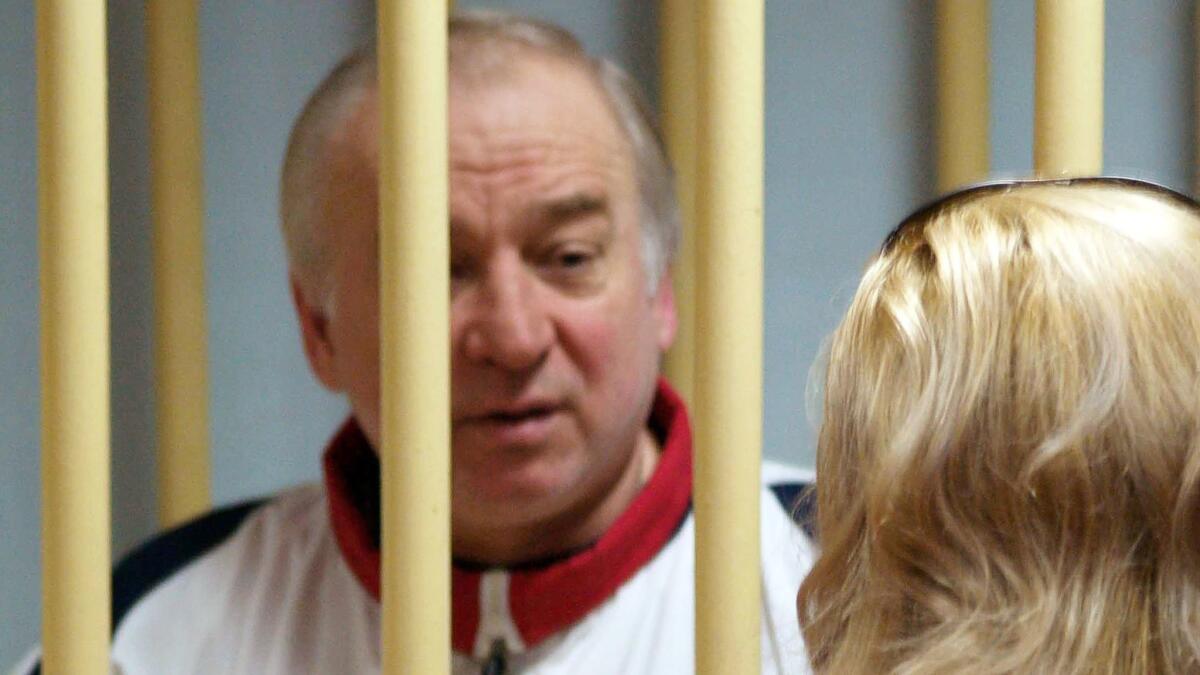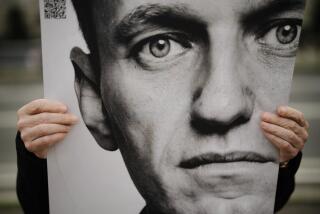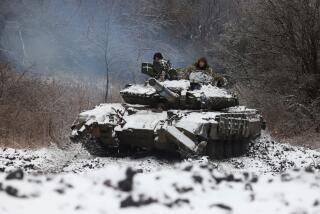British counterterrorism agents take over probe of Russian ex-spy’s mysterious collapse

Reporting from London — As clues emerged Tuesday in the case of the Russian ex-spy who was struck down in a British provincial city by a sudden life-threatening ailment, one name cropped up again and again: Alexander Litvinenko.
Litvinenko was the former Russian intelligence officer and outspoken Kremlin critic who died an agonizing death in London in 2006 from poisoning with radioactive polonium-210. A decade later, a British inquiry blamed Russian intelligence for targeting him, with President Vladimir Putin’s likely blessing.
British officials strenuously cautioned against any premature casting of blame in the collapse on Sunday of a man identified as Sergei Skripal, 66, who was given refuge in the United Kingdom following a spy-centric 2010 prisoner swap with Russia.
But, reflecting the extraordinary circumstances, British authorities also said the investigation was being led by counterintelligence personnel, and the government of Prime Minister Theresa May warned of serious consequences for any parties found responsible.
Moscow denied any knowledge of what befell Skripal, who — together with a 33-year-old woman named Tuesday in news reports as his daughter Yulia — was found semi-paralyzed and vomiting on a bench outside a shopping center in the British cathedral city of Salisbury.
Both he and his daughter, who was reported to have been visiting from Russia, remained in critical condition and under intensive care, officials said Tuesday.
A statement from London’s Metropolitan Police said Tuesday that counterterrorism investigators had taken the lead in the case because of “unusual circumstances” requiring specialized expertise, but said it was not yet being treated as a terrorist incident.
“This has been a fast-paced investigation, and our focus has been on what caused these people to become critically ill, and whether or not criminal activity took place,” said Kier Pritchard, the chief constable of Wiltshire, the county where Salisbury is located.

Police said there was no indication of risk to the general public, although emergency personnel called to the scene had undergone medical checks.
Foreign Secretary Boris Johnson, speaking to members of Parliament on Tuesday, specifically invoked the Litvinenko case, although he was careful to draw only a theoretical comparison— at least so far.
Citing “echoes of the death of Alexander Litvinenko,” Johnson told lawmakers: “I say to governments around the world that no attempt to take innocent life on [British] soil will go unsanctioned or unpunished.”
Without specifically blaming the Kremlin for attacking Skripal, Johnson described Russia as a “malign and disruptive force.”
Other observers suggested it would take a long time for the full facts to come to light.
Oliver Bullough, a journalist and author who wrote extensively about the Litvinenko case, noted that a decade elapsed before a British inquiry reached a conclusion. It’s too early to determine whether Russia struck at Skripal just as British officials said it did at Litvinenko, Bullough said, but “the parallels are pretty stark.”
“Again, it’s a former Russian intelligence officer living in refuge in the U.K. who has taken ill after exposure to an unknown substance,” he said.
The Kremlin, for a second day, professed puzzlement Tuesday over the events in Salisbury, and offered to assist authorities in the investigation. Putin allies were quick to accuse Britain, and the West in general, of seeking to sabotage the Russian president in advance of an election this month that he is virtually guaranteed to win.
But Paul Goble, a former State Department analyst, said that if anything, the growing furor surrounding Skripal could boost Putin’s domestic standing.
Goble told the BBC that implied accusations against Moscow helped feed the Putin narrative that “Russia is a besieged fortress, and that people need to rally around him to resist the West.”
When Litvinenko was fatally stricken, many Western analysts said his poisoning appeared aimed at driving home a brutal message: Enemies of Putin, a onetime KGB officer, could not expect to find haven anywhere — especially not a turncoat spy. Skripal was convicted in Russia of being a double agent for Britain.
The Litvinenko case generated a wave of international outrage. He lingered for more than a week before succumbing to the effects of a fatal dose of polonium, which he was believed to have ingested as he sipped a cup of tea at a London hotel bar. Images of the 43-year-old defector lying bald and wan in his hospital bed, weakening daily, flashed around the world.
As they did in the Litvinenko probe, British authorities aimed for a detailed reconstruction of events leading up to the incident. They were scrutinizing security camera footage, interviewing witnesses and scouring locales like a pizzeria and pub for clues as to Skripal and his daughter’s movements and activities before they were felled.
In Moscow, Kremlin spokesman Dmitry Peskov called the episode “tragic,” but professed complete ignorance of the circumstances.
“We don’t possess any information about what could have been the cause, and what this could be connected to,” Peskov said in a phone call with journalists. Asked about parallels being drawn to the Litvinenko case by analysts and in media reports, Peskov retorted sarcastically: “Well, that didn’t take them long.”
The Russian Embassy in London, in a statement on its website, denounced “speculations which ultimately lead to a vilification of Russia.”
For Litvinenko’s loved ones, though, the unsettling episode opened up old wounds.
“It’s like déjà vu,” Litvinenko’s widow, Marina, told BBC Radio Four, citing Russia’s “old-style KGB system.”
“It’s still all the same,” she said. “If there is an order to kill somebody, it will happen.”
Special correspondent Boyle reported from London, staff writer King from Washington and special correspondent Ayres from Moscow.
More to Read
Sign up for Essential California
The most important California stories and recommendations in your inbox every morning.
You may occasionally receive promotional content from the Los Angeles Times.











